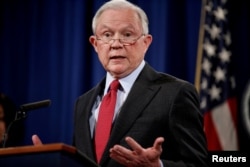U.S. Attorney General Jeff Sessions has rescinded former president Barack Obama's policy that relaxed enforcement of federal marijuana laws in states where it is legal.
Sessions' action will allow federal prosecutors in those states to determine how aggressively to enforce the laws.
Thursday's announcement came three days after retail cannabis stores in California opened for business for the first time, launching what advocates say will eventually be the world's largest market for legal recreational marijuana.
The legalization of marijuana for recreational use in California, seven other states and the District of Columbia may escalate tensions between state and federal drug enforcement officials led by Sessions, a staunch opponent of legalization.
Sessions has compared marijuana to heroin and has blamed it for sharp increases in violence.
The Justice Department considers marijuana a Schedule 1 drug, the same category as heroin, LSD and cocaine. Independent Senator and former Democratic presidential candidate Bernie Sanders responded to Sessions' decision on Twitter, contending that marijuana has been miscategorized.
The use of marijuana for medicinal use is legal in 29 states and the District of Columbia. Democratic Senator Kirsten Gillibrand said Thursday Session's decision could deny patient access to using the substance for medical treatment and disproportionately subject minorities to prosecution.
"This is about public health, and it's about reforming our broken criminal justice system that throws too many minorities in prison for completely nonviolent offenses."
Gillibrand called on her colleagues to support her legislation that aims "to keep the federal government out of the way when doctors and patients decide that medical marijuana is the best treatment for them."
White House spokesperson Sarah Huckabee Sanders told reporters Thursday "the president believes in enforcing federal law" and Sessions' action gives law enforcers "the tools to take on large-scale distributors."
Despite opposition to the Sessions announcement, several national associations of law enforcement officers have come out in support of the move.
Chuck Canterbury, president of the Fraternal Order of Police, released a statement Thursday applauding Sessions' move.
"Like our members, he (Sessions) is also a strong proponent of federal enforcement of our nation's narcotics laws. ... When marijuana was 'legalized' in Colorado, traffic-related deaths due to marijuana rose from 13 percent to 20 percent. This is costing people their lives," Cole said in the statement.
"Our members don't make law or policy -- we enforce it. If our citizens want to change the existing law, they should do so," he added. "As law enforcement officers, we cannot pick and choose what laws will be enforced."
J. Thomas Manger, president of the Major Cities Chiefs Association, which is the country's largest law enforcement agency, said in a statement on Thursday, "Today, Attorney General Jeff Sessions has announced a return to the long-established policy of the Justice Department regarding marijuana.
"Unless or until Congress changes the law, marijuana trafficking, cultivation, distribution, possession and use remain illegal under federal law," Manger said in the statement. The statement from Major Cities Chiefs said the organization does not believe marijuana should be legalized.
National polls have shown a majority of Americans now support legalization of marijuana, which has ballooned into a multimillion-dollar industry that helps fund schools and law enforcement agencies.













